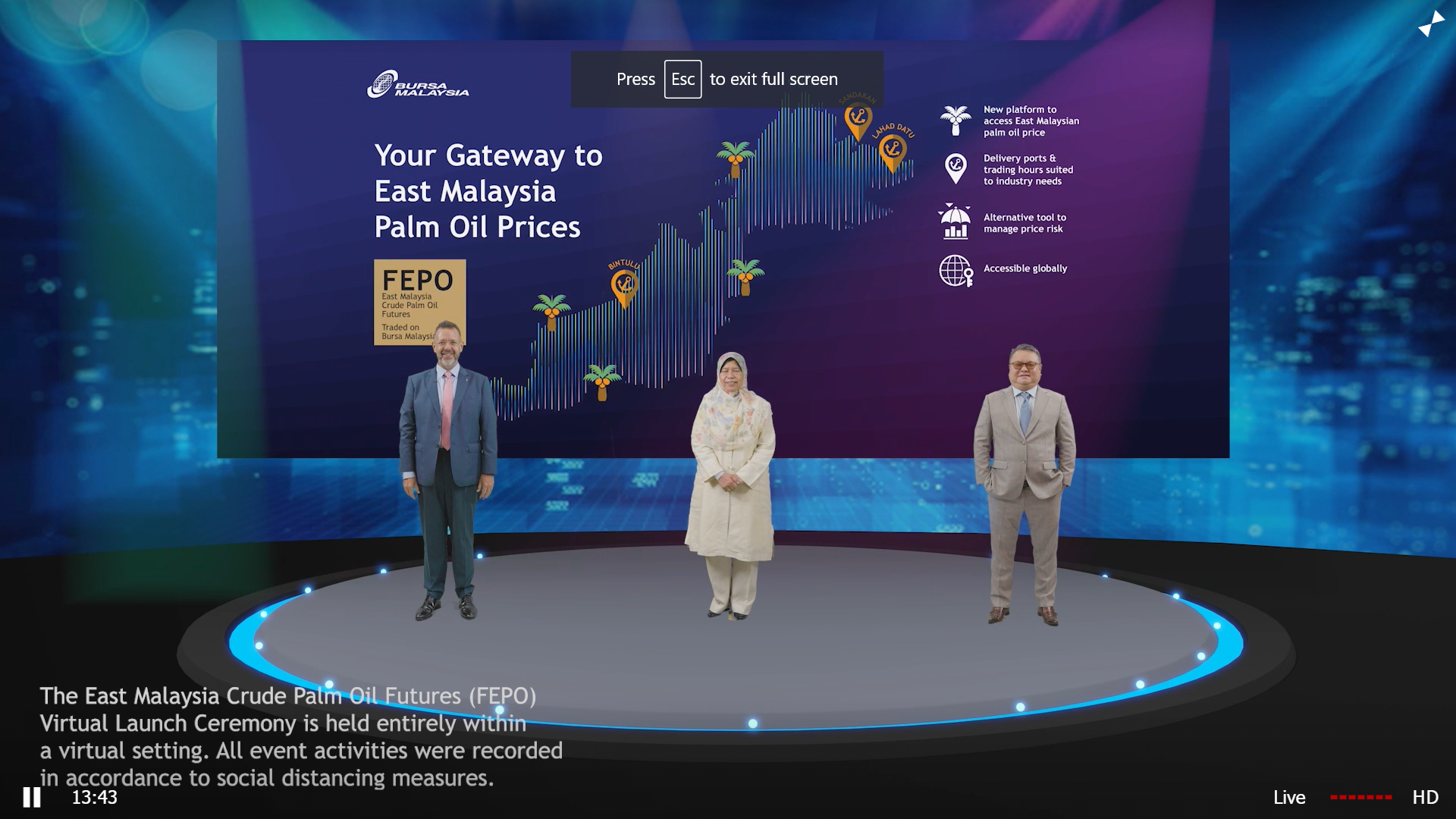
Muhamad Umar (left) is pictured with Plantation Industries and Commodities Minister Datuk Zuraida Kamaruddin (centre) and Ho during the virtual launch of the FEPO contract.
KUCHING: The addition of the East Malaysia Crude Palm Oil Futures (FEPO) is a timely move which will strengthen Bursa Malaysia Derivatives Bhd’s (Bursa Malaysia Derivatives) palm oil complex offerings, solidifying its position as the leading global hub for trading palm oil complex derivatives.
According to Bursa Malaysia Derivatives chairman Datuk Muhamad Umar Swift, with Sabah and Sarawak accounting for nearly half of the country’s crude palm oil (CPO) production, the need for a hedging avenue that caters to East Malaysian palm oil players could not be more timely.
“The new FEPO contract is a significant development that will provide greater price transparency and an alternative risk management tool for palm oil industry players in Sabah and Sarawak, the two states that account for 45 per cent of Malaysia’s crude palm oil production,” Muhamad Umar said in his keynote speech at the virtual launch of the FEPO contract on Monday.
“With physical delivery ports in Sabah and Sarawak, the FEPO contract will eliminate the logistical cost barrier that has kept East Malaysian firms from hedging with Crude Palm Oil Futures (FCPO).
“It will improve the cost effectiveness of managing price risk for palm oil industry players in East Malaysia, both upstream and downstream.
“As a result, their refining margins and competitiveness in selling end products to their customers will also improve.
“Additionally, the FEPO contract is designed to meet the needs of participants who have exposure to East Malaysian palm oil.
“In this regard, FEPO trading will begin at 9am to meet the demand of arbitrageurs trading in China’s market.”
Bursa Malaysia Derivatives chief executive officer Samuel Ho revealed in his speech that currently, three designated port tank installations (PTIs) in East Malaysia have been approved, with seven more in the process of application.
“The new FEPO contract will allow physical delivery to take place in East Malaysia with designated port tank installations or ‘PTIs’ in Bintulu, Lahad Datu and Sandakan,” Ho said.
“To date, these are the three designated PTIs that have been approved, with seven more in the process of application.
“In 2020, our PTIs in Peninsular Malaysia delivered 670,125 metric tons of CPO via FCPO physical delivery.
“These delivery activities, which are carried out through the Exchange’s platform, generate economic value for a variety of businesses.
“Some of which include palm-related logistical businesses, storage tank businesses, and independent quality surveyors.
“Similarly, the participation of new PTIs in FEPO will result in more job opportunities and generate higher economic values for the palm oil-related businesses in East Malaysia.”
On another note, Muhamad Umar highlighted that as a strong proponent of fostering sustainable development and promoting responsible growth of the agricultural industry, the new FEPO contract will adopt the same Malaysian Sustainable Palm Oil certification (MPSO) requirement for physical delivery.
“It follows the implementation of the MPSO certification requirement on the Exchange’s FCPO physical delivery, which took effect on April 1, 2021.
“This is accomplished by incorporating a traceability document into the physical delivery process, which requires the seller to submit the MPSO certification, among other details, to the Exchange-approved Port Tank Installations.
“Since the implementation, between April to August, the Exchange has delivered about 504 thousand metric tonnes of MSPO-certified CPO, representing a 71.2 per cent increase as compared to around 295 thousand metric tonnes that were traded via FCPO in 2020 over the same period.
“The addition of FEPO will strengthen Bursa Malaysia Derivatives’ palm oil complex offerings, solidifying our position as the leading global hub for trading palm oil complex derivatives.”
Muhamad Umar also noted in his speech that looking ahead to 2022, market participants need to brace themselves for another uncertain year, with numerous key elements having the potential to cause heightened price volatility.
He said that these included the unpredictable weather conditions, uncertain economic recovery, and potential changes to global trade policy.
“Amid the economic volatility, I am pleased to note that trading volume in our derivatives market continues to see remarkable growth.
“In 2020, we saw a total trading volume of 18.2 million contracts. This was a 35 per cent increase from 2019.
“Further, the Exchange set 18 new trading records last year.”
According to Muhamad Umar, this included, among others; highest ever monthly trading volume of over two million contracts for all derivatives products and a new record of 14.6 million FCPO contracts were traded on the Exchange in 2020, which is equivalent to 365 million metric tonnes of crude palm oil, representing five times of the world’s production.
“Continuing the success from 2020, the Exchange recently recorded approximately 9.6 million total contracts traded during the first half of 2021.
“The overall monthly trading volume for FCPO also reached an all-time high of over 1.7 million contracts in June 2021, which is equivalent to 42.6 million metric tonnes of crude palm oil traded.
“This surpasses the previous high of 1.66 million contracts traded in March of 2020.”
